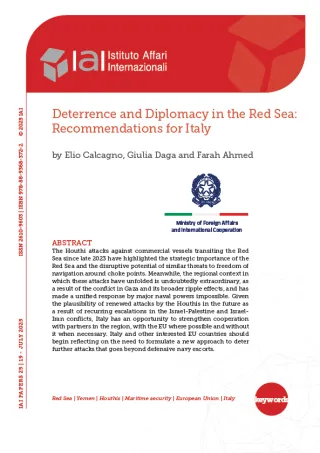Titolo completo
Deterrence and Diplomacy in the Red Sea: Recommendations for Italy
The Houthi attacks against commercial vessels transiting the Red Sea since late 2023 have highlighted the strategic importance of the Red Sea and the disruptive potential of similar threats to freedom of navigation around choke points. Meanwhile, the regional context in which these attacks have unfolded is undoubtedly extraordinary, as a result of the conflict in Gaza and its broader ripple effects, and has made a unified response by major naval powers impossible. Given the plausibility of renewed attacks by the Houthis in the future as a result of recurring escalations in the Israel-Palestine and Israel-Iran conflicts, Italy has an opportunity to strengthen cooperation with partners in the region, with the EU where possible and without it when necessary. Italy and other interested EU countries should begin reflecting on the need to formulate a new approach to deter further attacks that goes beyond defensive navy escorts.
Paper produced in the framework of the project “Routes of dètente: maritime security and cooperation scenarios through the Red Sea”.
1. The Red Sea crisis
2. Maritime trade
2.1 Ports and connectivity
2.2 Economic and environmental costs
3. Freedom of navigation disrupted
3.1 The Houthis’ new threat
3.2 A fragmented response
4. Regional politics and the role of Italy
4.1 The Red Sea and the conflict in Yemen
4.2 The Red Sea and the Israeli-Palestinian conflict
4.3 The other Red Sea littoral countries
5. Balancing deterrence and diplomacy
Recommendations
References


